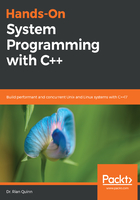
Pointers versus references
In the previous section, we discussed pointers in length, including how pointers can take on two values—valid or null (assuming corruption is not part of the equation).
The problem with this is that the user must check whether the pointer is valid or not. This is normally not an issue when using pointers to define the contents of memory (for example, laying out memory using a data structure), but often, pointers in C must be used simply to reduce the overhead of passing a large object to a function, as in the following example:
struct mystruct {
int data1{};
int data2{};
int data3{};
int data4{};
int data5{};
int data6{};
int data7{};
int data8{};
};
void test(mystruct *s)
{
}
int main(void)
{
mystruct s;
test(&s);
}
// > g++ scratchpad.cpp; ./a.out
In the previous example, we create a structure that has eight variables in it. Passing this type of structure with a value would result in the use of the stack (that is, several memory accesses). It is far more efficient to pass this structure with a pointer in C to reduce the cost of passing the structure to a single register, likely removing all memory accesses entirely.
The problem is that, now, the test function must check to make sure the pointer is valid before it can use it. Therefore, the function trades a set of memory accesses for a branch statement and possible pipeline flush in the CPU, when all we are trying to do is reduce the cost of passing a large object to a function.
As stated in the previous section, the solution is to simply not verify the validity of the pointer. In C++, however, we have another option, and that is to pass the structure with a reference, as follows:
struct mystruct {
int data1{};
int data2{};
int data3{};
int data4{};
int data5{};
int data6{};
int data7{};
int data8{};
};
void test(mystruct &s)
{
}
int main(void)
{
mystruct s;
test(s);
}
// > g++ scratchpad.cpp; ./a.out
In the previous example, our test() function takes a reference to mystruct{} instead of a pointer. When we call the test() function, there is no need to get the address of the structure, as we are not using a pointer.
C++ references will be leveraged heavily throughout this book, as they greatly increase both the performance and stability of a program, especially while system programming, where resources, performance, and stability are critical.